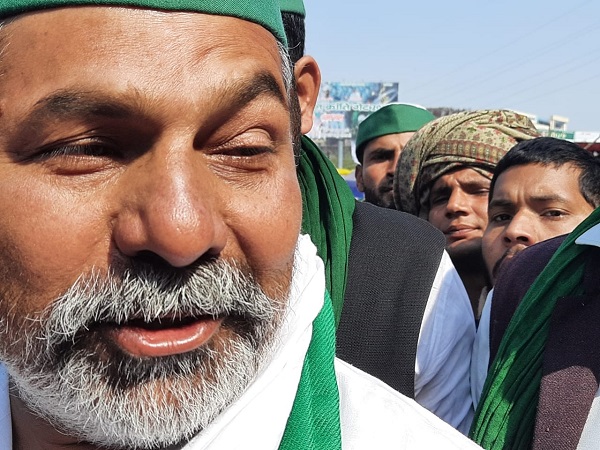New Delhi, (Samajweekly) The emotional speech by Bharatiya Kisan Union (BKU) leader Rakesh Tikait on January 28 at the Delhi-Uttar Pradesh Ghazipur border acted as “elixir” for the protesting farmers, who were feeling defeated after a number of cases were registered against farmer union leaders for the violent clashes on January 26.
In an emotional speech, a teary-eyed Tikait went on to threaten that he shall give up his life for the farmers’ cause and will not leave thhe protest site.
Addressing the farmers, Rakesh Tikait had said, “We were ready to surrender peacefully but the BJP’s local MLAs have been called to beat the protesting farmers. There is a conspiracy against us. Now, I will not surrender even if the police fires bullets at us.”
Tikait also said he will “hang” himself but he will not surrender and urged the farmers to keep their tents that have been in place since November 26 last year, safe.
Hours later, his outburst struck a chord not just with the protesters but also among farmers throughout the country and his hometown in Uttar Pradesh’s Muzaffarnagar, from where farmers started arriving at Ghazipur border on their motorcycles, bicycles and tractors once again.
The next day, the crowd which had thinned at Ghazipur border, once again swelled to thousands and Tikait became the face of farmers’ protest across the country.
But who actually is Rakesh Tikait?
Rakesh is the second son of farmer leader Mahendra Singh Tikait, an influential figure in Muzaffarnagar, who is credited with having founded the Uttar Pradesh branch of the BKU on October 17, 1986.
The BKU was founded in 1978 by Chaudhary Charan Singh who went on to serve as the fifth Prime Minister of India from 1979-1980.
He is also the younger brother of Naresh Tikait, who heads the all-powerful Baliyan Khap in Uttar Pradesh. Although Naresh has inherited his father’s legacy, it is Rakesh, who has emerged as the more popular farmer leader.
Differences between the two siblings are common knowledge even though they belong to the same farmers outfit. However, the two brothers have come closer after the developments that took place in the farmers’ agitation after the Republic Day violence
Rakesh Tikait had previously served as a constable with Delhi Police and also had a short stint in politics. He contested the 2007 Uttar Pradesh assembly elections from the Khatauli assembly seat with Congress support, albeit unsuccessfully.
In 2014, he contested the Lok Sabha elections from the Amroha constituency on a Rashtriya Lok Dal (RLD) ticket.
Rakesh has two younger brothers — Surendra, who works as a manager in a sugar mill and Narendra, engaged in agriculture. He is the father of two daughters and a son. He has often been at loggerheads with various governments on a range of farmers’ issues, including loan waivers, minimum support price (MSP), power tariff and land acquisition in states such as Uttar Pradesh, Haryana Rajasthan, Madhya Pradesh.
He has spent a number of nights behind the bars for defying government orders on several farm-related issues.
Tikait is considered a formidable Jat farmer leader and the number of Jat farmers in western Uttar Pradesh is high. The community can play a big role in the win or loss of any party.
When asked about if this fight is now a Jats vs state government fight,speaking to IANS, Tikait said, “No it is not, there is a farmer from every class in the movement. I have heard this Jat word for the first time in this movement, I have objection to it, this fight is between farmers and the government.”
He also pointed to people standing near him and said, “Are these Jats …?”
To a question about the sudden change in the crowd and support at the protesting site, he said “This fight is for farmers only”.
Asked about how the movement was impacted by the violence at Red Fort and in several areas of Delhi on Republic Day he said, “There was a storm, and twigs, branches and hollow trees broke up in this storm, and now only the strong pillars are left standing.”
Even the farmers’ panchayat held in Muzaffarnagar last week and in Haryana’s Jind this week points to the growing support for Tikait and the farmers’ movement in the wake of his emotional outburst.
The protesting farmers have been camping at the borders of Delhi since November 26, 2020, demanding withdrawal of the Farmers Produce Trade and Commerce (Promotion and Facilitation) Act 2020, the Farmers (Empowerment and Protection) Price Assurance and Agricultural Services Agreement Act 2020, and the Essential Commodities (Amendment) Act 2020, implemented by the central government, along with purchase of crops at minimum support price.










